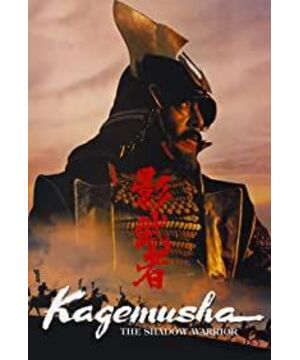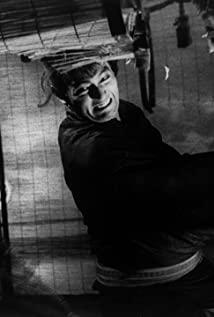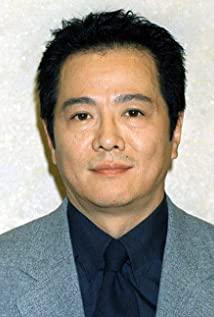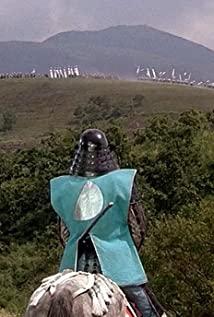Takeda Shingen's wisdom is not only reflected in the military, but also in the understanding of people. The most difficult person to know is probably one's own relatives, and among the relatives, the children are the closest. The meaning of pro includes feelings and interests, and it is a problem for all wise men. One of Takeda's retainers in the film said that Takeda did not pass the throne to his son because the son's mother's family is now the enemy of the Takeda family, so he directly passed the position of the lord to his grandson, and the son was only a guardian. This may be a cause. But it can also be interpreted like this: Because Takeda understands his son's character and knows that he is not a successful person, his impulse is very likely to lead to the demise of the Takeda family. Therefore, he chose to block the news of his death and shock the princes with his might.
Takeda's shadow warriors chose to take on this important task under the influence of Shingen's personality and Shinlian's kindness. Xinlian knows very well that the sadness of man as a shadow is a shadow without a body. It is very difficult for a man to abandon his habitual freedom and dignity, unless he finds a new freedom and dignity under a duty or spiritual inspiration. I don't think the change of Shadow Warrior is a distortion of human nature. It is true that his expulsion and final death in battle are indeed tragic, but that is not personal sorrow, but personal dignity. This kind of personal dignity is not given by others, but is one's own. Only when the dignity is own is the real dignity, even if the soldiers throw stones at him.
Perhaps the one who threw stones at him was sad, and Katsuyuki Takeda, who was defeated in the end without obeying his father's will. Tragedy stems from such a system—a system inherited by blood. System means that the power of the system (form) exceeds the power of the individual spirit. Spirit or honor can only come from some great personal experience or revelation. And the eastern blood complex hopes to inherit this honor is destined to be impossible. External imitation inevitably leads to internal reluctance, distorted into a desire for power. Shenglai did not want to live under his father's glory, and the relationship of his mother's clan also made him feel that he had no prestige among the retainers, so he wanted to use victory to gain status and dignity like his father. When dignity becomes a strong desire for the gaze of others, then its next step is destruction, destruction of others, or destruction of oneself. If the shadow warrior can always be in Shingen's shadow, perhaps Takeda's arrogance will not be exhausted. Because he inherited Shingen's "moving like a mountain" spirit to a large extent, and Katsurai never understood that.
However, the Takeda family eventually went into decline, and the seeds of decline have been planted in the desire to make the Takeda family prosperous. Can Sheng Lai's disposition be unable to keep up, can he be completely blamed? Can the Shadow Warrior really help the Takeda family not be defeated if their identity is not discovered? Takeda Shingen's sanity can try to avoid it, but it is impossible to avoid it. Families, like people, are all going to die, and even a wise person cannot predict when they will die.
It is normal for life to be impermanent. The so-called tragedy refers to this common occurrence. And this kind of father-son tragedy is a common occurrence in the Eastern blood system. Among them, there are people like Oda Nobunaga, who sings to wine and regards life as a game and a dream; there are people like Ieyasu Tokugawa, who forbears the rules and only sees the goal and does not think about tragedy; Like Uesugi Kenshin, he was detached from the battle and converted to Buddhism at the same time as he fought; or, like Takeda Katsuyuki, he was defeated by the discomfort of his temperament; and like the shadow warrior, he died in the dignity of the tragic battle song. (There is no and there can be no way of outright approval or disapproval here)
Finally, let's talk about the aesthetic significance of tragedy presented by this film. Undoubtedly, the shadow finally became the resurrection of the body, but it was an exiled body. Here we see the fragility of the powerful after losing form (identity). If criticism is for the occurrence of tragedy, then praise is for the non-occurrence of tragedy; the former for vulnerability, the latter for strength or morality. Orientals like to make history and character morality one-way, and then evaluate them with morality, but at the beginning of the film, they rejected the one-way morality with the fact that "the one who steals the hook kills the one who steals the country". As for Takeda Shingen himself, we Only see the charm of personality and military talent. However, this is indeed a downright Eastern tragedy, not only in its system, but also in its perspective. We praise the flash but are scared off by the dark ending, we scold cruelty and have to sympathize with each other. This is an oriental tragedy, and no evaluation can be done completely. It is best to "stand still until the veil is lifted".
View more about Kagemusha reviews











